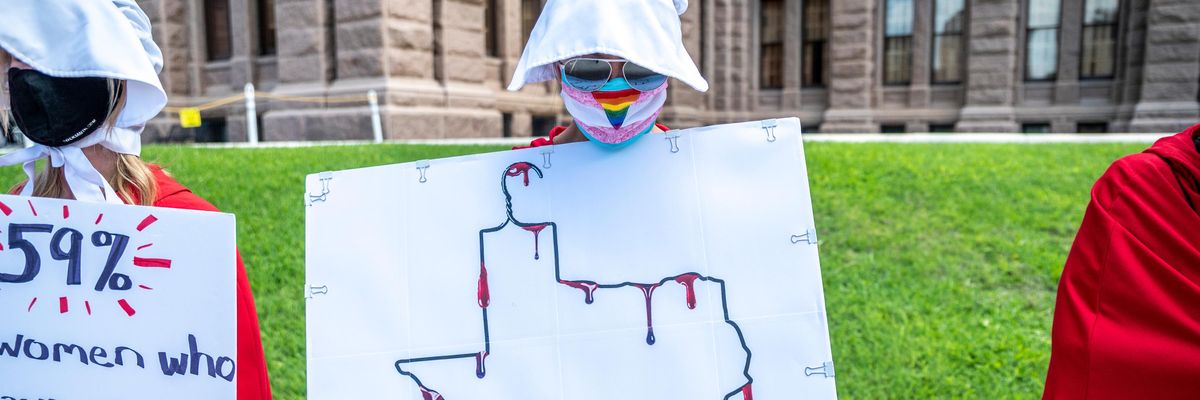In the ongoing battle for reproductive justice, the intersection of religious beliefs and public policy casts a long shadow over the fundamental rights of individuals, particularly those in marginalized communities, including LGBTQ+ and non-binary individuals. That’s why the newly elected Speaker of the House Mike Johnson’s remark that “the separation of church and state is a ‘misnomer’” is so chilling.
The principle of the separation of church and state is not just a constitutional provision but a safeguard crucial to preserving the autonomy and well-being of diverse populations, particularly in matters as personal as reproductive health.
Reproductive justice hinges on the right to make informed, personal decisions about one’s body, family, and future. However, the intrusion of religious ideologies into legislation poses a significant threat to this autonomy. The separation of church and state is not a mere abstraction; it is the cornerstone of protecting individual freedoms from the encroachment of religious doctrines that may not align with the diverse beliefs and circumstances of our society.
The separation of church and state provides the necessary framework to safeguard patients from being denied essential medications based on someone else’s religious beliefs.
The Women’s Reproductive Rights Assistance Project (WRRAP), the largest independent abortion fund, works with marginalized communities, including LGBTQ+ and non-binary individuals, who often bear the disproportionate brunt of restrictive reproductive policies driven by religious ideologies. These communities face unique challenges, including limited access to affirming healthcare and discriminatory practices that compound the impact of religiously motivated policies. The separation of church and state becomes a crucial shield against the intersectional barriers faced by individuals at the crossroads of multiple marginalized identities.
The role of all healthcare providers is pivotal in upholding medical ethics and ensuring that patient care is driven by evidence-based practices rather than religious doctrine. Physicians take an oath to prioritize the well-being of their patients, and this commitment should transcend religious biases. When the separation of church and state is compromised, healthcare professionals face the ethical dilemma of navigating between religiously motivated policies and their duty to provide comprehensive, unbiased care.
In societies where religious beliefs infiltrate legislative decisions on reproductive rights, doctors find themselves torn between upholding their commitment to patient well-being and adhering to laws that may compromise patient health. WRRAP and other abortion funds have seen countless cases through the years even prior to the overturning of Roe. The separation of church and state becomes a protective shield for doctors, allowing them the professional autonomy to prioritize evidence-based medical care over religious doctrines.
The impact of religious influence extends beyond doctor-patient interactions to the realm of pharmacies, where pharmacists may encounter moral objections to dispensing certain medications. When religious beliefs seep into legislation, pharmacists may be compelled to prioritize personal convictions over the immediate healthcare needs of patients. This not only infringes on the principle of secular governance but also jeopardizes individuals’ timely access to reproductive healthcare.
WRRAP has heard of many cases in which a patient was denied access to medications like misoprostol, which are used to manage other conditions like autoimmune diseases and gastric ulcers, but, because this drug is also used for medication abortions and treatment for ectopic pregnancies, these prescriptions are denied or delayed by some pharmacists, infringing on and jeopardizing these individual’s healthcare needs.
A pharmacist must dispense medication according to professional and ethical standards, without discrimination. The separation of church and state provides the necessary framework to safeguard patients from being denied essential medications based on someone else’s religious beliefs. Access to contraceptives, emergency contraception, and other reproductive healthcare necessities should be determined by medical necessity, not by the religious tenets of those dispensing them, nor should a patient have to be asked by a provider to take a pregnancy test to confirm they are not pregnant.
As we navigate the landscape of reproductive justice, the separation of church and state stands as a protection against the erosion of individual autonomy. It is an assertion that decisions about reproductive healthcare should be guided by medical ethics, evidence-based practices, and the diverse beliefs of individuals, including those in the LGBTQ+ and non-binary communities, not by the doctrines of any particular faith.
To truly champion reproductive justice, we must fiercely defend the separation of church and state. It is a collective responsibility to ensure that policies respect the autonomy of every individual, irrespective of their background, beliefs, or socio-economic status. In strengthening this separation through advocacy in our communities and through the leaders we elect, we fortify the foundation of a just society—one that upholds the dignity and rights of all.

